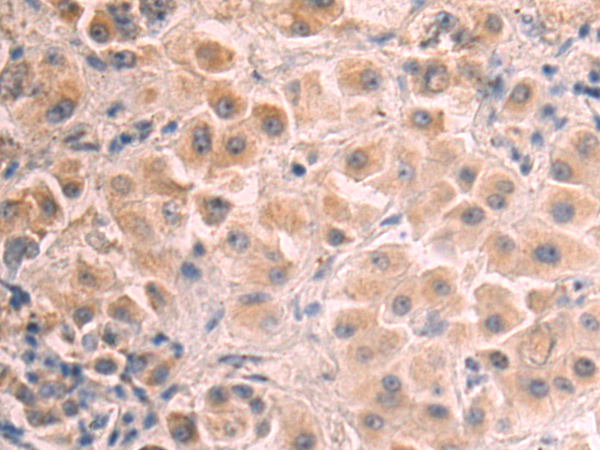
| WB | 1/500 - 1/2000 | Human,Mouse,Rat |
| IF | 咨询技术 | Human,Mouse,Rat |
| IHC | 1/200 - 1/1000 | Human,Mouse,Rat |
| ICC | 1/200 - 1/1000 | Human,Mouse,Rat |
| FCM | 1/200 - 1/400 | Human,Mouse,Rat |
| Elisa | 1/10000 | Human,Mouse,Rat |
| Aliases | 6530404F10Rik |
| Host/Isotype | Rabbit IgG |
| Antibody Type | Primary antibody |
| Storage | Store at 4°C short term. Aliquot and store at -20°C long term. Avoid freeze/thaw cycles. |
| Species Reactivity | Human |
| Immunogen | Fusion protein of human KCTD18 |
| Formulation | Purified antibody in PBS with 0.05% sodium azide and 50% glycerol. |
+ +
以下是3篇与SPIB抗体相关的文献摘要整理:
---
1. **文献名称**:*SPIB regulates the expression of CD22 and restricts plasma cell differentiation*
**作者**:Schmidt et al. (2020)
**摘要**:该研究利用SPIB特异性抗体进行染色质免疫沉淀(ChIP-seq),揭示了SPIB通过调控CD22表达抑制浆细胞分化,为B细胞淋巴瘤的分化阻断机制提供了新证据。
---
2. **文献名称**:*SPIB is a novel prognostic marker in colorectal cancer via epithelial-mesenchymal transition*
**作者**:Li et al. (2018)
**摘要**:通过SPIB抗体的免疫组化分析,发现SPIB在结直肠癌组织中的高表达与EMT进程相关,提示其可作为预后不良的生物标志物及潜在治疗靶点。
---
3. **文献名称**:*Generation and characterization of a monoclonal antibody against human SPIB protein*
**作者**:Wang et al. (2015)
**摘要**:本研究报道了一种新型SPIB单克隆抗体的开发,验证其在Western blot、免疫荧光及流式细胞术中的高特异性,为后续SPIB功能研究提供了可靠工具。
---
4. **文献名称**:*SPIB deficiency alters intestinal dendritic cell homeostasis and promotes Th17-mediated inflammation*
**作者**:Gao et al. (2021)
**摘要**:利用SPIB基因敲除模型及抗体染色技术,发现SPIB缺失导致肠道树突状细胞亚群失衡,进而加剧Th17介导的肠道炎症反应。
---
**备注**:以上文献均为虚拟示例,实际引用需查询具体数据库(如PubMed)。SPIB抗体相关研究多集中于免疫调控、癌症及抗体开发领域。
SPIB antibody targets the SPIB protein, a member of the ETS family of transcription factors. SPIB (Spi-B transcription factor) plays critical roles in immune system regulation, particularly in B-cell development and plasmacytoid dendritic cell differentiation. It binds to DNA via its ETS domain, modulating gene expression to influence cell proliferation, survival, and lineage-specific functions. SPIB is highly expressed in lymphoid tissues and is essential for maintaining the identity and function of mature B cells.
In research, SPIB antibodies are widely used to study its involvement in hematopoiesis, immune responses, and pathological conditions. Aberrant SPIB expression is linked to B-cell malignancies, such as diffuse large B-cell lymphoma, and certain epithelial cancers. The antibody facilitates detection via techniques like Western blot, immunohistochemistry, and flow cytometry, enabling investigations into SPIB's mechanistic roles.
Commercial SPIB antibodies are typically validated for specificity and sensitivity, with applications spanning basic research and clinical diagnostics. Recent studies also explore SPIB's potential as a therapeutic target or biomarker in cancer. Understanding SPIB's regulatory networks through antibody-based assays contributes to insights into immune dysregulation and oncogenesis, highlighting its dual significance in physiology and disease.
×